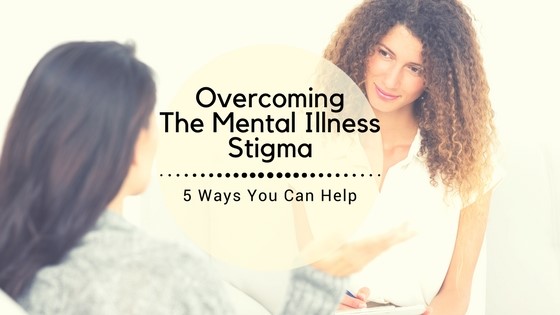Overcoming The Mental Illness Stigma: 5 Ways You Can Help
Overcoming The Mental Illness Stigma
5 Ways You Can Help
One in five Americans, according to the National Alliance on Mental Illness (NAMI), experiences a mental illness in their lifetime and one in twenty-five experiences a a serious mental illness that interferes with or limits one or more life functions. Despite these numbers, according to www.mentalhealth.gov, only 44% of adults with a diagnosable mental illness and less than 20% of children and adolescents receive treatment. While there are many reasons for this gap in care, one of the most commonly reported reasons for not receiving treatment is the stigma.
What Is Mental Illness Stigma?
Mental illness stigma occurs when someone views a person in a negative way because they have a mental health disorder. It is a mark of disgrace that differentiates one from others, a negative belief system and negative behaviors that creates a prejudice which leads to damaging actions and discrimination. Stigma has been described as a feeling of shame or judgment from others. Stigma, however, can also be internally based, a personal belief that mental illness is due to weakness or is self-induced.
Harmful Effects Of Stigma Include:
- Lack of willingness to obtain treatment (which can exacerbate the mental illness/condition)
- Lack of understanding/support from family, friends, coworkers, etc. and a subsequent feeling of isolation
- Bullying or harassment
- Discrimination in housing, employment, education
- A negative impact on self-esteem, self-confidence
- Feelings of shame and hopelessness
Myths About Mental Illness
Part of the reason that mental health stigma is so prevalent is due to the lack of knowledge.
- Myth: Mental illness is rare. Truth: According to Mental Health America (MHA), 43.7 million Americans struggle with a mental health condition annually. If you are not one of those people, I can assure you that you know someone who is.
- Myth: People with mental illness are violent and dangerous. Truth: Most people with serious mental illness are never violent. In fact, people with serious mental illness are far more likely to be victims of violence that the perpetrators of violence. According to the U.S. Department of Health and Human Services, those with severe mental illness are over 10 times more likely to be the victims of violence than the general population.
- Myth: People with mental illness are weak, damaged, or different. Truth: Mental illness is not the fault of the person who has the condition. It is caused by a complex interplay of genetics, biology, social and environmental factors.
- Myth: You can tell when someone has a mental illness. Truth: People with mental illness can be just as functional and productive as those without. Many suffer in silence. The symptoms of mental illness are not always visible to others. There are many highly successful people who have achieved despite their illness including singer, Demi Lovato (bipolar disorder, anorexia, addiction), actress, Emma Stone (anxiety), and Novel Prize Winner in Mathematics, John Nash (schizophrenia).
5 Ways You Can Help Diminish The Stigma On Mental Health
- Speak out against stigma and educate others. Talk openly about mental health. Consider sharing your knowledge at local events, via a lecture at a local high school or library, or open up a dialogue at your own dining room table. Educate your family. Explore their questions and misconceptions. Part of a book club? Select a book that addresses mental illness or features a character with mental illness. Share accurate articles about mental health on your social media.
- Be aware of your own slang. People often use mental health diagnoses as pejorative descriptors that can be hurtful to those with mental illness. "My ex is totally schizo," "The weather is so bipolar, " I'm so OCD about my clothes matching." If you are guilty of this habit, be cognizant of your language and make a change. If you're in the presence of someone who inaccurately uses these terms, educate them in a caring and compassionate manner.
- Act! Be part of a community organization. Participate in local mental health advocacy and/or fund-raising opportunities. Local and national groups, such as the National Alliance on Mental Illness (NAMI) are often seeking volunteers for an array of tasks.
- Show compassion for those with mental illness. See the person, not the condition. If someone you know or love is experiencing a mental illness, don't try to "fix" them. What is not helpful are phrases such as, "Just look on the bright side," "You have such a good life," or "You have no reason to be depressed." Instead, inquire about how you can help. Sometimes just being present and demonstrating a non-judgmental approach, listening, and offering support is beneficial. Should the person ask for further help, you can assist them with connecting with resources. Perhaps aid them with scheduling an appointment with a psychologist or psychiatrist, offer to drive them to an appointment, help them research local mental health support groups, or offer a weekly "coffee date" so that they feel less isolated.
- Model self-care. Be kind to yourself and engage in self-care. Whether you have a mental illness or are supporting someone with one, self-care in imperative to mental health. Self-care is anything that "fills up your gas tank" and can be as simple as taking time to read a book to saying "no" to something that feels overwhelming.
Mental health stigma almost always stems from a lack of understanding. Make the decision to make a difference by helping educate someone today!
Related Blogs
If you found this blog post helpful, I suggest reading my recent blog posts: The Dark Side of Therapy, What Is Psychotherapy and Reasons NOT to Use Your Insurance For Psychotherapy.





Comments
Post a Comment